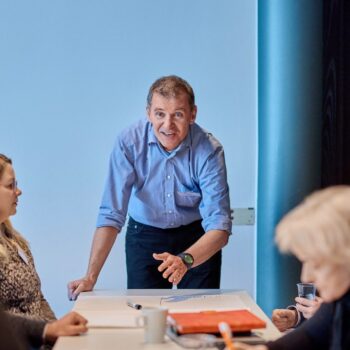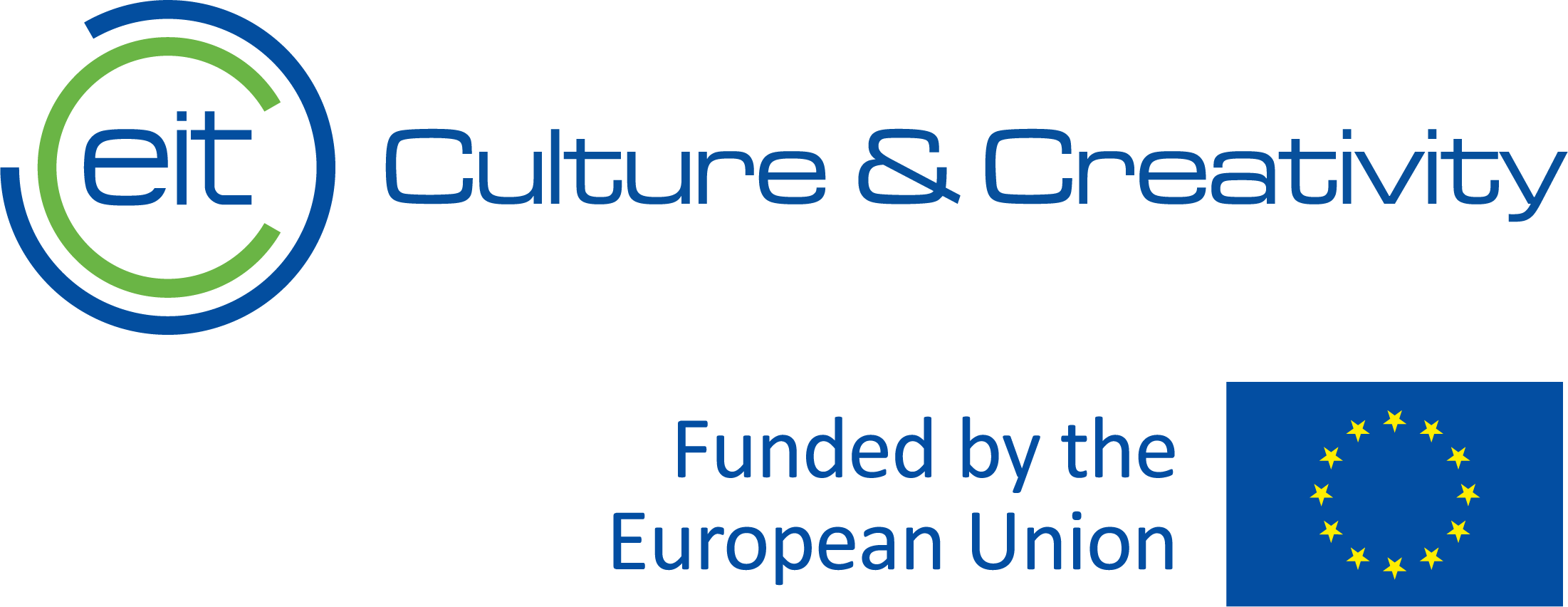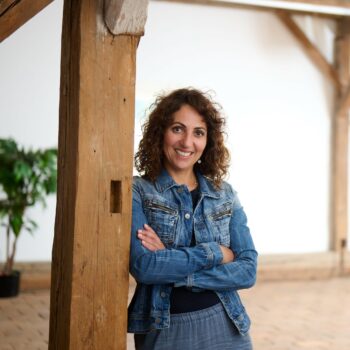Policy Forum:
How do we unlock the Transformative Power of the Cultural & Creative Industries for Cities and Regions?
Nowadays cities and regions frequently encounter shared challenges: the isolation of urban centers, the reclamation of brownfields, the haunting specter of business vacancies, uncertainties in terms of green, digital and societal transformation and the drain of intellectual capital, among others. Yet, within the crucible of these challenges, a transformative force has emerged – the Cultural and Creative Industries as catalysts, igniting profound and innovation-focused transformations. Their impact spreads out far beyond their own domain, transforming the entire economy and society with impact.

Navigating the Future through Creative Industries
Join us for an unprecedented voyage into this transformative realm, as we present the Policy Forum: Navigating the Future through Creative Industries. This interactive event gathers ambassadors and policymakers from diverse cities and regions, sharing their pragmatic insights, illuminating the path towards fostering an equitable playing field for the Cultural & Creative Sectors and Industries (CCSI).
In this policy forum, ambassadors and seasoned policy makers from diverse cities, regions and nations will share their practical insights and guidance on creating a level playing field for Cultural & Creative Sectors and Industries (CCSI). In an interactive format you will get firsthand insights in how to translate strategies into actions and discover the benefits and secrets behind attracting CCSI in order to positively influence the competitiveness of your region. Don’t miss the opportunity to directly exchange with this high-level group of experts and policy makers!
What you will get
- Knowledge of seamlessly integrating CCSI into your policy framework cascading its influence across local, regional, and national levels.
- Discover the good practices that resonate with the dynamic shifts by CCSI driven new ways of work, cooperation and change impactful for living and working environments.
- Policies are made by people – so let’s exchange and explore the cross-disciplinary magic of Cultural & Creative Industries!
Join to bring policies into action!
For more information on the Policy Forum please contact Christina Koch, Community Manager of CLC SEA, clc-sea@eit-culture-creativity.eu
Our Speakers
Ana Ilić is a Senior Advisor for Creative Industries and Tourism to the Prime Minister of the Republic of Serbia. She leads a team of a national platform Serbia Creates for promotion of export potential in the field of creative industries, innovation, and knowledge-based economy.
“Creative Industries are important in Serbia, not only for their ability to boost the economy and support job creation, especially for youth and women, they also offer us the opportunity to present modern and innovative Serbia in a new and exciting light.“
– Ana Ilić // Policy Forum
Danijela Pavlovic is the Head of the Creative and Cultural Department in the Ministry of Education and Culture of the Republic of Sprska, Bosnia. She is also a Senior Expert Associate for Publishing and Literature.
“Creative industries represent an excellent path to economic development, but also a contribution to the development of the entire society by encouraging creativity, knowledge exchange and the concept of sustainable development.”
– Danijela Pavlovic // Policy Forum

Danijela Pavlovic
Head of the Creative and Cultural Department in the Ministry of
Education and Culture of the Republic of Sprska, Bosnia

Deputy Head of the Department for Information and Communication
Technology and the Creative Industries at the Ministry of Economic Affairs
Susanne Ast is an innovation expert with an inclination for the creative industries. She studied economics and political science at the University of Tübingen and got her PhD on European policy and cooperation at the University of Konstanz. She is Deputy Head of the Unit „Information Technologies and Creative Economy“ of the Ministry of Economic Affairs, Labour and Housing Baden-Württemberg, Germany.
„It is the creative ability of people that transforms good technologies into real innovations that people can trust and benefit from. Our ability to cooperate across disciplines will therefore determine whether we successfully shape the current transformation successfully.“
– Susanne Ast // Policy Forum
Peter Baroš, worked at the Ministry of Culture, at the European affairs and cultural development section. As a SIGIC’s general secretary, he led projects for international collaboration, music publishing, and training to strengthen capacity and professionalisation in the sector. He was the chief organiser of the Fête de la Musique in Slovenia, the head of Music Slovenia, and a president of the International Association of Music Information Centres.
“The cultural and creative sector undoubtedly plays a unique developmental role in society and the economy. With its independent and critical attitude this sector shows us a vision of an inclusive and sustainable future. The task of policy makers is to listen to the needs of the sector and to formulate inclusive policies and development strategies based on cross-sector integration and a sustainable, socially just cultural policy.”
– Peter Baroš // Policy Forum
Daniela Limberger is the Head of the Agency for Location and Economy Leonding, a city in Austria. She is an expert on city-development policies and on how to use creative industries to revive city centers.
„The creative economy can revitalize and strengthen municipalities by fostering innovation, attracting talent, and generating economic activity. Its unique ability to blend art, culture, and technology not only drives economic growth but also infuses cities with vibrancy, making them more appealing and dynamic places to live and visit.“
– Daniela Limberger // Policy Forum
Luc Schmerber has 30 years of experience with regional innovation, technology transfer and competitiveness strategies. He is a policy expert for the Interreg Europe Policy Learning Platform since 2017; the scope of his activities covers the Policy Objectives ‘Smarter Europe’ and ‘Social Europe’.
“Cultural and creative industries have a strong cross-sectoral contributions to almost any sector of the economy and policy making. They are key to the transformation for a smarter, greener and more social Europe.”
– Luc Schmerber // Policy Forum

Luc Schmerber
Policy expert for the Interreg Europe Policy Learning Platform
Evisi Kopliku is an Expert on Competitiveness at Regional Cooperation Council (RCC), based in Sarajevo, Bosnia and Herzegovina. Her focus is mainly on regional industrial development, entrepreneurship support and women economic empowerment. Working closely with Southeastern Europe and in particular the Western Balkans, she coordinates the abovementioned agendas, with a particular focus on priority industries of the region, such as creative industries, tourism and green and circular economy.
Anja Zorko is the Head of the Centre for Creativity in Ljubljana, Slovenia. She is an expert and advisor working on the development of cultural and creative sectors and industries in Slovenia. She focuses on the topics of CCSI and innovation ecosystem development, transdisciplinary cooperation, policy recommendations and the support programmes and measures development.
Christina Koch is the Head of the Coordination Unit EU-Projects at Austria Wirtschaftsservice – Austria’s national promotional bank. Additionally, she’s the Community Manager of the EIT Culture & Creativity Co-Location-Center South-East Europe & Alps and is an expert in policy making processes.
The event is fully booked!
Thank you for your interest in the European Culture & Creativity Days Vienna.
The registration is now closed, and the event is fully booked!
If you have any questions regarding this event, please contact us at kreativwirtschaft@wko.at
The European Culture & Creativity Days Vienna are part of the EIT Culture & Creativity financed by the European Union and the principal partner Business Agency Vienna, hosted by Kreativwirtschaft Austria.








